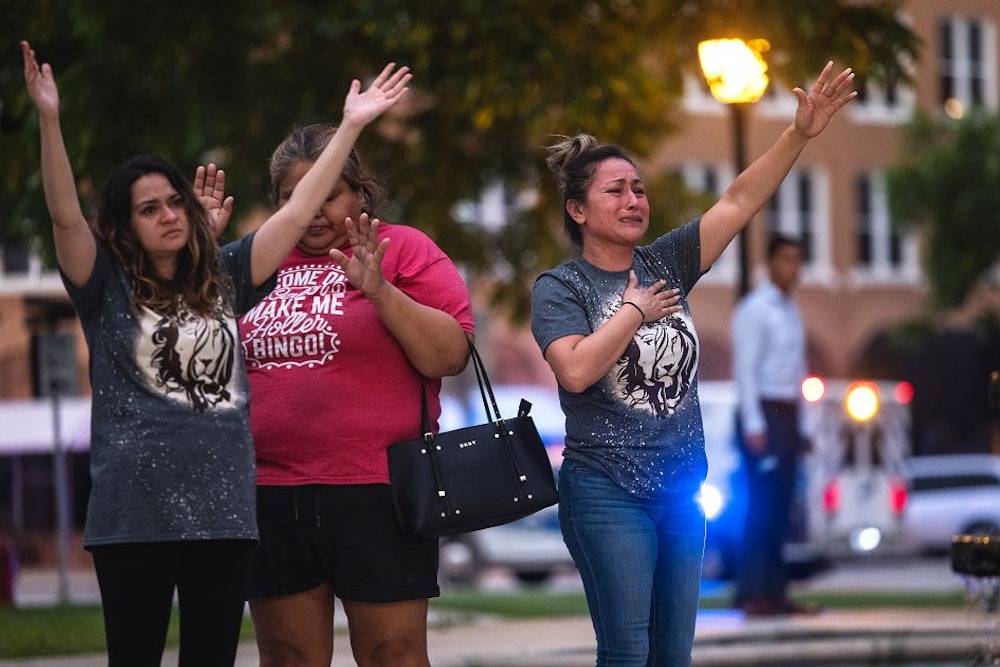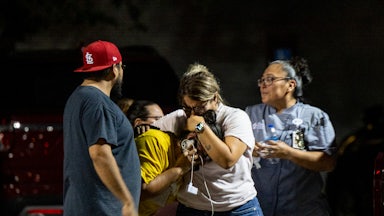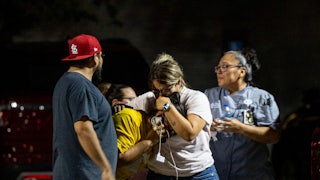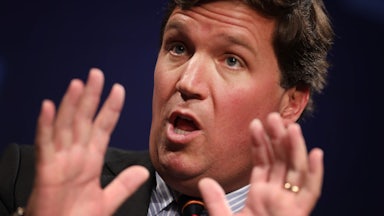There is something nauseating about the familiarity of the aftermath of mass shootings—a wretched feeling that’s been amplified by the slaughter of 19 fourth graders and two teachers in Texas on Tuesday. Eleven days ago, a racist teenager walked into a supermarket in Buffalo, New York, and murdered 10 shoppers and employees; a day later, a man walked into a Taiwanese church in Southern California and shot six, killing one. The grim list tracks back beyond recent history: Parkland was four years ago, Las Vegas five years ago, Orlando six, Sandy Hook 10.
Politically, the response to these shootings has been the same, with occasional tinkering at the margins depending on the particularities of the shooter. On the right, both in media and politics, there has been an insistence on “not politicizing” these tragedies, even as Republicans insist on perverse measures like arming teachers—despite the fact that the GOP has spent much of the last several months vilifying teachers as “groomers”—and cling to insufficient explanations like “this is a mental health problem, actually” and “video games are too violent (even though we believe that Americans should legally be allowed to own all the guns in Halo).”
For Democrats, there is outrage and little else. On Wednesday, Senate Majority Leader Chuck Schumer announced that he would not be bringing a gun control bill to the floor. “If the slaughter of schoolchildren can’t convince Republicans to buck the NRA, what can we do?” Schumer asked. “Sadly, this isn’t a case of the American people now knowing where their senators stand. They know. They know because my Republican colleagues are perfectly clear on this issue. Crystal clear.” In one sense, he’s not wrong: Republicans won’t support any gun control legislation even while schoolchildren are gunned down in their classrooms. On the other hand, why these expressions of impotent outrage? Do Democrats think that they can simply tweet their way to swaying their colleagues on supporting popular gun control measures? Who are Democrats trying to convince, if not “voters” or “Republicans?” Who is the audience for these sentiments?
The larger sense of inertia around the gun control debate on Capitol Hill has given rise to another narrative, which holds that the country is growing “numb” to mass shootings. For a decade now, but particularly after the Sandy Hook massacre that left 28 dead failed to catalyze meaningful change, news outlets have increasingly posed the question: Are we simply too overwhelmed by the constant sense of grief and tragedy to feel as acutely in the aftermath of mass death as we once were? In 2013, NPR asked this question following a mass shooting in Washington, D.C.’s Navy yard that left 12 dead; yesterday, The New York Times’ live blog observed in a headline that “the latest mass shooting hits a nation numb to gun violence.” (The headline has since been changed to “The Stupefying Tally of American Gun Violence.”)
Any cursory scroll through social media—or, particularly, conversation with a parent—in the aftermath of Tuesday’s tragedy tells a much different story. The outpouring of grief and anger is profound. It is perhaps even stronger because of the need to break that inertia. Everyone knows how these things go: We rage and mourn and then, in a week or two, we rage and mourn again. In between, nothing happens—but the nothing that’s happening is not the fault of the ragers and mourners.
This is not numbness. There is frustration and fatalism and no small amount of cynicism. The notion that the country is “numb” to the mass violence that breaks out here on a seemingly daily basis is simply not true. People have become conditioned, for good reason, to expect lawmakers to do precisely what they did yesterday: helplessly piss and moan and flap their arms and make excuses and ask for voters to make their voice heard in November—as if voters’ previous failure to do so is what brought us to this point.
For news outlets, there is a related but slightly different problem. We have covered so many of these, often several in a year, that an industry that thrives on “new” information struggles to come up with anything unique to say about the latest outbreak of senseless violence. Instead, there has been a slow recognition that the senseless violence is the reality we’re living in—unlike many tragedies, there’s nothing unrecognizable in a mass shooting; this is just day-to-day life. News outlets haven’t quite figured out how to adequately convey this—or, perhaps, admit this. Hence, for many, the “numb” moniker feels like an explanation.
None of the “numbness” derives from witnessing so much violence, week in and week out. Rather, it stems from the grim knowledge that our elected officials will do little beyond making their wan pleas for prayers or votes. If there is a “numbness,” it’s not to the slaughter of children or churchgoers or people just trying to do their shopping on a beautiful Saturday afternoon. The grief and the anger is as raw and as energetic as it’s ever been. There was simply a time, once, when we felt it was outlandish to think our lawmakers would fail to act on behalf of defenseless children. We now know it’s not so outlandish. “Numb” is just the imperfect term being used to describe this sad state of affairs, because we’ve not really invented a word to describe what it’s like to live in a reality that’s so galling, and so stupid.










